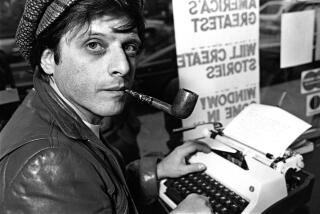Literary biography: possibility and peril
Henry James, T.S. Eliot and W.H. Auden did not want to endure a biography, and tried desperately but vainly to prevail against predatory life-writers. In his essay on the French novelist George Sand, James boldly mounted a military defense: “The pale, forewarned victim, with every track covered, every paper burnt and every letter unanswered, will, in the tower of art … [withstand] the siege of all the years.”
Like the biographer in “The Aspern Papers,” whom Henry James calls a “publishing scoundrel,” James Atlas penetrated the citadels of Delmore Schwartz and Saul Bellow, who portrayed Schwartz as the title character in his novel “Humboldt’s Gift.” Schwartz achieved a stunning success with his first story, “In Dreams Begin Responsibilities,” but Atlas had difficulty describing the depressing descent of the writer, during the last half of his life, from literary god to self-destructive drunkard. Schwartz also wrote a mass of inferior work and the tin-eared Atlas is forced to praise his feeble imitations of Eliot.
Atlas is a literary biographer who attempts in “The Shadow in the Garden” to provide an account of his work and his obsessions. The biographer is an artist on oath who must weigh all the evidence like a lawyer and always do justice to the subject. Atlas was awed at first by the magnitude of his task, resurrected many obscure but worthy figures, didn’t linger on boring genealogy, felt the voyeuristic thrill of discoveries that seemed to jump off the page, delighted in knowing more about the subject than anyone else in the world, struggled for permission to quote (sometimes rescinded), fended off the political correctness of editors, remembered to thank everyone in the acknowledgments (some authors chastise those who refused to help) and got both nasty and gratifying letters from readers.
Biographers should remain an unobtrusive presence, concentrate on the reader’s interest rather than their own obsessions.
But with Bellow, as with Schwartz, Atlas was not always equal to the task. Bellow’s life was lacerated by outraged friends, family vendettas and extortionate ex-wives. Atlas declares that “the multiple marriages and general chaos of his life exacted a high toll.” But he doesn’t recognize that these personal disasters provided incandescent material and inspired Bellow’s imagination. Bellow thrived on chaos and needed to suffer in order to create: no tears in the writer, no tears in the reader. He was alienated from his three sons by three different wives, but compensated with three literary replacements: Martin Amis, James Wood and Leon Wieseltier.
On March 30, 1994, after I’d asked Bellow about writing his biography, he explained that Atlas “came to me and told me he had already signed a contract for the book. On a few occasions I have talked to him about my life and deeds. But I have his number I assure you.” In this book, Atlas admits that he was “ungenerous” and “had outbursts of spite.” He describes how he cunningly allayed the suspicions of the patient and generous Bellow and extracted what he needed. During the 11 years he took to write the biography, he fell prey to a common danger and resented Bellow for devouring his life. His biography was unremittingly negative and his moral judgments portrayed him as superior to his subject. Atlas is least interesting in the present book when he talks about himself and tries to disguise his egoism and arrogance with a veneer of mock modesty.
He is severe about the social critic Dwight Macdonald, who spent many hours editing Atlas’ life of Schwartz. An envious blowhard, Macdonald exclaimed that “Hemingway couldn’t write” and that the learned man-of-letters Edmund Wilson was only interested in “showing off how much he’d read.” Atlas later notes that Wilson “never showed off his vast erudition.” Finally, Atlas found the “fierce, irascible, antagonistic” Macdonald intolerably oppressive.
Atlas’ portraits of Alfred Kazin and Richard Ellmann are accurate. Kazin, whom Schwartz called “a serious menace to criticism,” was venomous, rebarbative and bitter. Ellmann, whose life of James Joyce is the greatest modern biography, was brilliant and kind. But in a fit of pique Atlas misjudges John Bayley, who refused to tutor him at Oxford. Bayley (I can attest) was an exceptionally stimulating lecturer and teacher. His memoir of his wife Iris Murdoch descending into the darkness of Alzheimer’s, “Elegy for Iris” is not “pitiless,” as Atlas asserts, but self-sacrificial and sympathetic.
Atlas is least interesting in the present book when he talks about himself.
“The Shadow in the Garden” has no clear structure. Atlas was urged to follow chronology and avoid a meandering narrative. But he has no table of contents, chapter titles or preface to guide the reader through his chaotic work. He jumps around like a demented frog, returning to the same subjects in different chapters and dropping derivative sketches of Greek and Roman historians into the middle of the book. Hundreds of pointless and irritating footnotes force the reader to jump between two parallel texts. The friends he profusely thanks for reading his typescript should have corrected his two-dozen errors (list on request).
Atlas describes following the authors’ trajectory from birthplace through foreign travels to the grave (“Death,” Atlas sadly observes, “is the biographer’s worst enemy”), studying unpublished letters and manuscripts in widely scattered archives, searching for school records, finding family and friends to interview, and discovering that famous older people are often quite lonely. During interviews he did not use a tape recorder. He learned to draw people out and remain silent, to take notes while eating and (sometimes) getting drunk, adding to his notes immediately after leaving. He refereed fights, often about money, between the children of different wives. My own responses from valuable sources ranged from “I curse the day you ever heard my name” when I tried to extract a privately owned manuscript by Somerset Maugham to “I’ve been waiting all my life for you to come” from the daughter of Robert Frost’s lover.
But there’s no need, as Atlas suggests, to “get it all in.” Not everything matters and you don’t have to scrutinize “every electric bill, every grocery list, every torn envelope.” Biographers should remain an unobtrusive presence, concentrate on the reader’s interest rather than their own obsessions and focus not on the facts of the life but on what these facts mean.
Atlas, who can’t quite break free from his subject, ends his book with a description of his own life that inadvertently recalls the sad end of Schwartz. The writer took out his garbage, suffered a heart attack and died in the elevator of a seedy Times Square hotel. Atlas carries his garbage bag out to the hall, pushes the button of the elevator and hurries back to his apartment before something terrible happens to him.
Meyers has published 25 biographies of authors, artists and actors. His memoir with biographical chapters, “Resurrections: Writers, Heroes — and a Spy,” will appear next year.
“The Shadow in the Garden: A Biographer’s Tale”
James Atlas
Pantheon: 400 pp., $28.95
More to Read
Sign up for our Book Club newsletter
Get the latest news, events and more from the Los Angeles Times Book Club, and help us get L.A. reading and talking.
You may occasionally receive promotional content from the Los Angeles Times.









